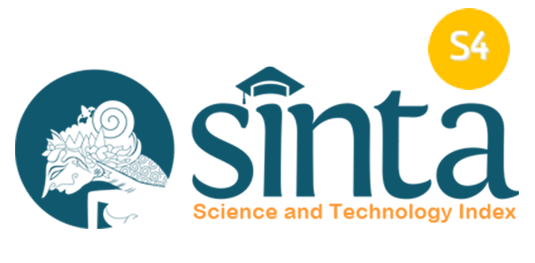Is a confidence needed in learning mathematics?
Abstract
Metacognitive blindness is often found in students with unsatisfactory academic performance. However, this study aims to reveal the process of metacognitive blindness that occurs during problem solving experienced by students with quite good academic performance. The data collected is in the form of words obtained through interviews and pictures of the work of research subjects. Description of data analysis and interpretation of the meaning of findings using text analysis. Analysis is carried out in all phases of problem solving, including analyzing, exploring, planning steps to solve problems, implementing a problem solving plan, and checking again. The results of qualitative analysis show that subjects who are students with good academic performance can experience anomalous results during the problem solving process. In this study, the anomalous result in question is a condition where the subject feels anomaly during the problem solving process, where the anomaly is actually not there. In this case, subjects who have good academic performance tend to have too much confidence. This makes the performance in the problem-solving process less optimal.
Keywords
Full Text:
PDFReferences
Alexander, J. M., Carr, M., & Schwanenflugel, P. J. (1995). Development of metacognition in gifted children: directions for future research. Developmental Review, 15(1), 1–37.
Creswell, J. W. (2012). Research design pendekatan kualitatif, kuantitatif dan mixed. Yogyakarta: Pustaka Belajar.
Dörr, L., & Perels, F. (2019). Improving metacognitive abilities as an important prerequisite for self-regulated learning in preschool children. International Electronic Journal of Elementary Education, 11(5), 449-459.
Dunlosky, J., Hertzog, C., Kennedy, M., & Thiede, K. (2005). The self-monitoring approach for effective learning. International Journal of Cognitive Technology, 10(1), 4–11.
Dunning, D., Johnson, K., Ehrlinger, J., & Kruger, J. (2003). Why people fail to recognize their own incompetence. Current Directions in Psychological Science, 12, 83–87.
Erickson, S., & Heit, E. (2015). Metacognition and confidence: Comparing math to other academic subject. Frontiers in Psychology, 6, 742.
Faradiba, S. S., Sadijah, C., Parta, I. N., & Rahardjo, S. (2019a). Metacognitive therapy for mathematics disorder. In Journal of Physics: Conference Series (Vol. 1157, No. 4, p. 042079). IOP Publishing.
Faradiba, S. S., Sa’dijah, C., Parta, I. N., & Rahardjo, S. (2019b). Looking without seeing: the role of metacognitive blindness of student with high math anxiety. International Journal of Cognitive Research in Science, Engineering and Education (IJCRSEE), 7(2), 53-65.
Fraenkel, J. R., & Wallen, N. E. (2006). How to design and evaluate research in education (6thed.). New York: McGraw-Hill.
Glaser, R., Schauble, L., Raghavan, K., & Zeitz, C. 1992. Scientific reasoning across different domains. In E. de Corte, M. C. Linn, H. Mandl, & L. Verschaffel (Eds.), Computer-Based Learning Environments and Problem Solving (pp. 345–371). Berlin Heidelberg: Springer Verlag.
Goos, M. (2002). Understanding metacognitive failure. Journal of Mathematical Behaviour, 21(3), 283-302.
Goos, M., Galbraith, P., & Renshaw, P. (2000). A money problem: A source of insight into problem solving action. International Journal for Mathematics Teaching and Learning, 1(3), 1-21.
Hassan, N., & Rahman, S. (2012). Problem solving skills, metacognitive awareness, and mathematics achievement: A mediation model. New Educational Review, 49(3), 201-212.
Jacobse, A. E., & Harskamp, E. G. (2012). Towards efficient measurement of metacognition in mathematical problem solving. Metacognition Learning, 7, 133–149.
Kim, Y. R., Park, M. S., Moore, T. J., & Varma, S. (2013). Multiple levels of metacognition and their elicitation through complex problem-solving tasks. The Journal of Mathematical Behaviour, 32(3), 377-396.
Kruger, J., & Dunning, D. (1999). Unskilled and unaware of it: how difficulties in recognizing one’s own incompetence lead to inflated self-assessments. Journal of Personality and Social Psychology, 77(6), 1121–1134.
Legg, A., & Locker, L. (2009). Math performance and its relationship to math anxiety and metacognition. North American Journal of Psychology, 11(3), 471-486.
Metcalfe, J., & Finn, B. (2008). Evidence that judgments of learning are causally related to study choice. Psychonomic Bulletin and Review, 15(1), 174–179.
Miller, T. M., & Geraci, L. (2011). Unskilled but aware: Reinterpreting overconfidence in low-performing students. Journal of Experimental Psychology: Learning, Memory and Cognition, 37(2), 502–506.
Ng, K. E. (2010). Partial metacognitive blindness in collaborative problem solving. Shaping the future of mathematics education: Proceedings of the 33rd annual conference of The Mathematics Education Research Group of Australasia (pp.446-453). Fremantle: Merga.
Safari, Y., & Arezy, S. (2012). Improving students' educational performance using strategic metacognitive training. Modern Journal of Education (MJE), 1(10-11), 27-31.
Son, L. K., & Sethi, R. (2010). Adaptive learning and the allocation of time. Adaptive Behavior, 18(2), 132–140.
Stillman, G. (2004). Strategies employed by upper secondary students for overcoming or exploiting conditions affecting accessibility of applications tasks. Mathematics Education Research Journal, 16(1), 41-70.
Swanson, H. L. (1990). Influence of metacognitive knowledge and aptitude on problem solving. Journal of Educational Psychology, 82(2), 306–314.
Wismath, S., Orr, D., & Good, B. (2014). Metacognition: Student reflections on problem solving. Journal on Excellence in College Teaching, 25(2), 69-90.
DOI: https://doi.org/10.18860/ijtlm.v2i2.8443
Refbacks
- There are currently no refbacks.
Copyright (c) 2020 International Journal on Teaching and Learning Mathematics

This work is licensed under a Creative Commons Attribution-NonCommercial-ShareAlike 4.0 International License.
Indexed by :
.png)
.jpg)
.png)

.jpg)


